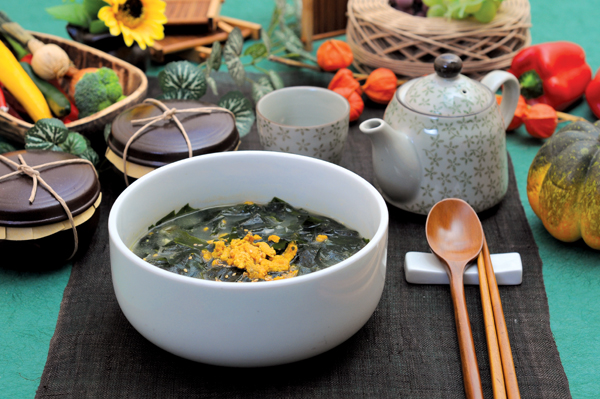
- Updated 2024.4.24 17:16
- All Articles
-
member
icon
-
facebook
cursor
-
twitter
cursor
| |
 |
|
| ▲ Seongge miyeokguk, or sea urchin roe soup. Photo courtesy Korea Restaurant Association |
It may sound exotic and strange, but seongge miyeokguk, or sea urchin roe soup, is commonly served in Jeju. Sea urchins, the small prickly balls found stuck to the rocks in the ocean, thrive near Jeju and are harvested by the haenyeo as well as commercial fishermen. Although not on the radar of most North American palates, sea urchins live in every ocean of the world and are served in the local cuisine of the Mediterranean and Japan, as well as in Korea. The lucky few who live in Jeju can enjoy fresh Jeju sea urchin, prized for its sweet taste and the clean flavor of Jeju’s unpolluted ocean.
Sea urchins are small globes ranging from two to 10 centimeters in diameter and have thick skins covered with spines the same length as their bodies. They vary in color from dark green through brown and black, to bright red or purple. The creatures have no visible membranes or eyes, yet are voracious eaters with five sharp teeth which they also use to defend themselves from predators. Their spines are used to move and to trap kelp, their major food source. If stepped on, the spines can cause a painful injury, but are not dangerous as sea urchins contain no venom. Jeju harvesters simply pry them from the rocks about 100 meters offshore for eating locally or export to Japan.
Sea urchin flesh can be eaten raw or lightly cooked, but it is the roe that is most prized around the world. The Japanese are by far the world’s largest consumer of whole sea urchins, which they serve raw as sushi and sashimi, with wasabi and soy sauce. In the Mediterranean, chefs serve the whole sea urchin in omelets, soups and sauces, or serve roe raw on French bread with a squeeze of lemon juice. In Chile, the creatures are also served raw, and usually accompanied by lemon, onion and olive oil. Sea urchins are widely eaten by coast-dwelling communities around the world. However, the whole sea urchin is not nearly as widely praised as the sea urchin roe found inside.
To harvest the roe, the urchins are simply turned upside down and the roe scooped from the body with a spoon. In Jeju, the roe is scooped raw onto seaweed soup. The resulting seongge miyeokguk is a traditional Jeju dish widely served on the island.
The soup is green, viscous and full of dark cooked kelp. Floating on top initially is the sea urchin roe, two dull orange chunks that slide through the kelp to the bottom of the bowl. Perhaps not the most beautiful soup to look at, its smell is delicious. The steam rising off the top carries the scent of fresh ocean air, salty and clean. The sea urchin roe dissolves completely, and is barely detectable in texture. The soup is salty and rich with a light seafood flavor. The kelp, filling the bowl in thick green layers, provides the main body of the soup, making for a surprisingly filling, warm and pleasant dish.
A famous restaurant for sea urchin roe soup is Yuri Ne, near the KCTV building in Shin Jeju. The interior is bustling, the walls lined with signatures and the food is every bit as delicious and comforting as the homey atmosphere and friendly service suggest. You can also find the soup at most seafood restaurants in Jeju.
|
|
|
|
|
|
|
|
ⓒ Jeju Weekly 2009 (http://www.jejuweekly.net)
All materials on this site are protected under the Korean Copyright Law and may not be reproduced, distributed, transmitted, displayed, published without the prior consent of Jeju Weekly. |
|
|
|
|
| Jeju-Asia's No.1 for Cruise |
|
|
|
Title:The jeju Weekly(제주위클리) | Mail to editor@jejuweekly.net | Phone: +82-64-724-7776 Fax: +82-64-724-7796
#503, 36-1, Seogwang-ro, Jeju-si, Jeju-do, Korea, 63148
Registration Number: Jeju, Ah01158(제주,아01158) | Date of Registration: November 10,2022 | Publisher&Editor : Hee Tak Ko | Youth policy: Hee Tak Ko
Copyright ⓒ 2009 All materials on this site are protected under the Korean Copyright Law and may not be reproduced, distributed, transmitted, displayed, published
without the prior consent of jeju weekly.com.

|




















